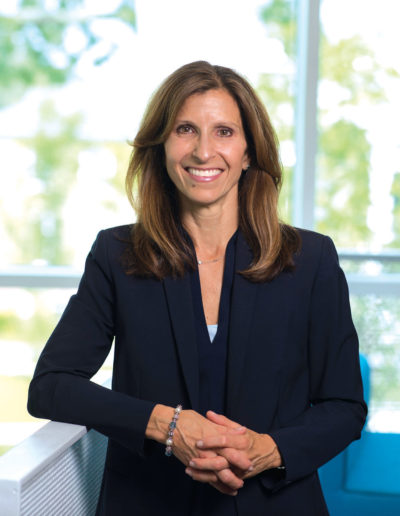
Photo: Tony Rinaldo
Marla Capozzi, MBA’96, chair of the Babson Board of Trustees
In the fall of 2017, Marla Capozzi, MBA’96, became the first woman elected chair of the Babson Board of Trustees, joining President Kerry Healey, the first woman president of the College. A leader in McKinsey Academy, the arm of consulting giant McKinsey & Co. that helps businesses rethink their approach to employee leadership and development, Capozzi has been a member of the board since 2011. Her expertise is strategy and innovation, which she has shared with Babson in numerous ways, from mentoring to teaching to advising. Now she will use her talents to help lead Babson toward its Centennial celebration and prepare for a changing future.
What made you choose Babson for your MBA?
I was working at Lotus/IBM, and I was moving into a new position in the innovation center where I would be helping to launch new products. So I re-evaluated going to a full-time MBA program and wanted to go to the number-one school in entrepreneurship.
After graduating, how did you re-engage with Babson?
Initially, through professor Joe Weintraub’s Coaching for Leadership and Teamwork Program. At McKinsey, it’s all about coaching— our teams and our clients—and it wasn’t a skill that I felt I had mastered in my other roles. So I thought that I could give back and work on my own skills at the same time.
Who asked you to be a trustee?
Former President Len Schlesinger. When the announcement came that Len was going to be president, he had been a client of McKinsey. I hadn’t spoken to him directly, but I knew about him. So I sent him a message, and we met. He later called me and said, “If you have so many ideas about how to make Babson better, why don’t you come and help fix it? I’d like you to become a trustee.” So I thought, OK, let’s give it a shot, really having no idea what to expect.
What do you like about being a trustee?
I really enjoy governance, but more importantly the people—trustees, staff, faculty, and students—are all amazing. They just want to do the right thing and have a great impact. It’s what has kept me engaged and energized. It’s both a challenging and exciting time to be affiliated with higher education, given the disruptions in technology, the future of work, and the changing global market. But I also feel like we have a fantastic opportunity to change the world.
What does it mean to students and others to see a woman as chair?
It’s funny—at this point in time, I never thought I’d be the first woman to do anything. It seems crazy that this is still happening. But I have come to believe that it has huge meaning, given the fact that Babson was founded as a college for men, and it remained that way for about 50 years. Today, we are one of the most internationally diverse schools, and two of the last three classes were more women than men. We have our first woman president. This level of diversity of all kinds is an important message to the world about Babson and what we value.
What are some of your goals as chair?
As part of our upcoming Centennial, we need to consider the past, present, and future vision for the College. The past grounds us and gives us an opportunity to reflect. Roger Babson founded this college with the intent of teaching business leaders differently, and out of that came the creation of the discipline of entrepreneurship. He also believed that business should be rendered in service of humanity, and those strong beliefs are with us today. Now we are leaders in entrepreneurship. We need to determine the impact we want to have in the next 100 years, and how we prepare Babson for that future. We have been the first college to do many things, so as we move forward, I want to continue with this pioneering tradition. Also, as education evolves, we will have different types of learners interacting with the College in many ways, from undergraduates and graduates to online and global learners. We want every student to have a uniquely Babson experience that they can’t get anywhere else.—Donna Coco
